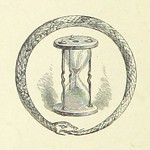
British Library digitised image from page 340 of .Favourite English poems and poets. Illustrated with ... engravings on wood from drawings by eminent artists. New and improved edition.
(Image by The British Library) Details DMCA
Sand through the hourglass.
Sand in my eyes.
Sleep don't come easy.
The moment is fragile.
I heard him say,
The moment is fragile.
I heard him come in.
I heard him say,
Sleep don't come easy.
Too many lies.
Rivers of lies.
Sand of lies.
Oceans of tears and lies.
Cities are fragile.
The moment is fragile.
Sleep don't come easy,
I heard him say.
Cities are fragile.
Sand through the hourglass.
Sleep don't come easy
I heard him say.
I'm tired, so tired.
I heard him come in
And head for his bed.
I heard myself say,
The forest is fragile.
Sand through the hourglass.
I heard the ocean crying
Oceans of tears.
I heard him say,
We're history.
Cities built on lies.
Sand-bagged.
Cities of crystal.
Cities of gleaming steel.
Cites of flood.
The broken record.
The moment is fragile.
It's a broken record.
Sleep don't come easy.
I heard him come in.
I'm tired, so tired.
The water is rising.
So tired,
He lay down.
He dreamed of cities of steel.
He dreamed of crystal cities.
He dreamed the ocean was crying.
We sand-bagged
The truth.
We lay down
In cities of sleep.
We sand-bagged
The fragile moment.
Sleep.
Sleep don't come easy.
In cities of sleep
We lay down.
The broken record.
We lied. I heard him.
We're history.
I heard him whisper
Like a broken record.
I'm tired. I'm tired.
Sand in my eyes.
Sand through the hourglass.
........................................
This poem was written 3 years ago. For me it captures the bone-wearying deja vu of living with climate change. In this poem sand is the sand of precious time running through the hourglass and it symbolizes sleep, but a dreamless sleep of oblivion or maybe a waking sleep or the half-sleep of the exhausted insomniac. (When I was little my mother told us that the feeling of little grains of sand in our eyes in the morning was the sand that the sandman sprinkled into our eyes to bring sleep and dreams but in this poem there is no balm of sleep. The sand is an irritant that inflames our vision, both inner and outer.) It is also the sand of the sandbags we pile up to keep back the rising surge of the sea. The man who comes home to the dark house to sleep is the poet's doppelgà �nger (I would like to suggest), or his shadow self who has been out in the world and returns home dead-tired to sleep but there is no rest for him, only dreams of spectral or visionary cities that seem void of life . . . cities of crystal and steel, built on lies (on sand). The line "we are history" carries the double entendre: we are the sum of who we have been, and we are finished.
This is a dark poem about the dark night of the soul. If we don't snap out of it there will be no time left for us. But the poem is also about time itself, which can be cyclical, finite or it can attenuate and stretch for as long as we need it to, in order to change the dream. Maybe we can fix the broken record. One thing that occurs to me (with three years having lapsed since I wrote this poem) is, when the poem ends, the sand is still flowing through the hour glass, and as long as the poem exists to read, it always will, which is a tricky way of stretching the moment. Also the hourglass is shaped like the figure 8, which is an ancient symbol of infinity, not like the uroborus, which is the closed loop, self-devouring, like the rapacious, extractive capitalism of the Western World, but the mobius strip.
(Article changed on Nov 03, 2021 at 8:30 AM EDT)




